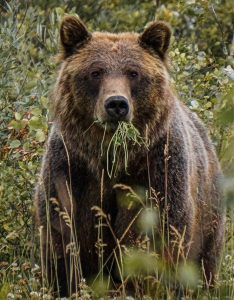
Jeff Nishima-Miller. Credit: UBC
Indigenous-led wildlife management (ILWM) is emerging in practice as a tool for stewarding the habitats and wildlife that support food security, cultural continuity, intergenerational learning, and well-being. ILWM will advance the assertion of Indigenous rights, jurisdiction, and self-determination.

Grizzly bear in the Tsilhqot’in region. Credit Max Nishima
CEAR PhD student Jeffrey Nishima-Miller is working with Xeni Gwet’in First Nation to advance knowledge and support the development and implementation of a wildlife management strategy for the Tsilhqot’in Declared Title Area (DTA).
The 2014 Supreme Court of Canada’s landmark Tsilhqot’in DTA decision created a range of management and planning needs for Tsilhqot’in communities. The DTA is set within the Caretaker Area of Xeni Gwet’in First Nation (one of six Tsilhqot’in communities). A priority identified by Nation is the need for a wildlife management strategy for the DTA.
Jeff’s research is collaborative with Xeni leadership, staff, and community members to support strategic wildlife management and planning for the DTA; including supporting models, tools and levers for goal achievement. To reflect qualities of location, knowledge, and values of Xeni Gwet’in First Nation, land-based learning and field work is integral to this project.
The work takes a responsive and collaborative approach, guided by the values and requirements of the Nation.
Support for this project is provided by the Social Sciences and Humanities Research Council, Mitacs, and the Eminence Fund at UBC.